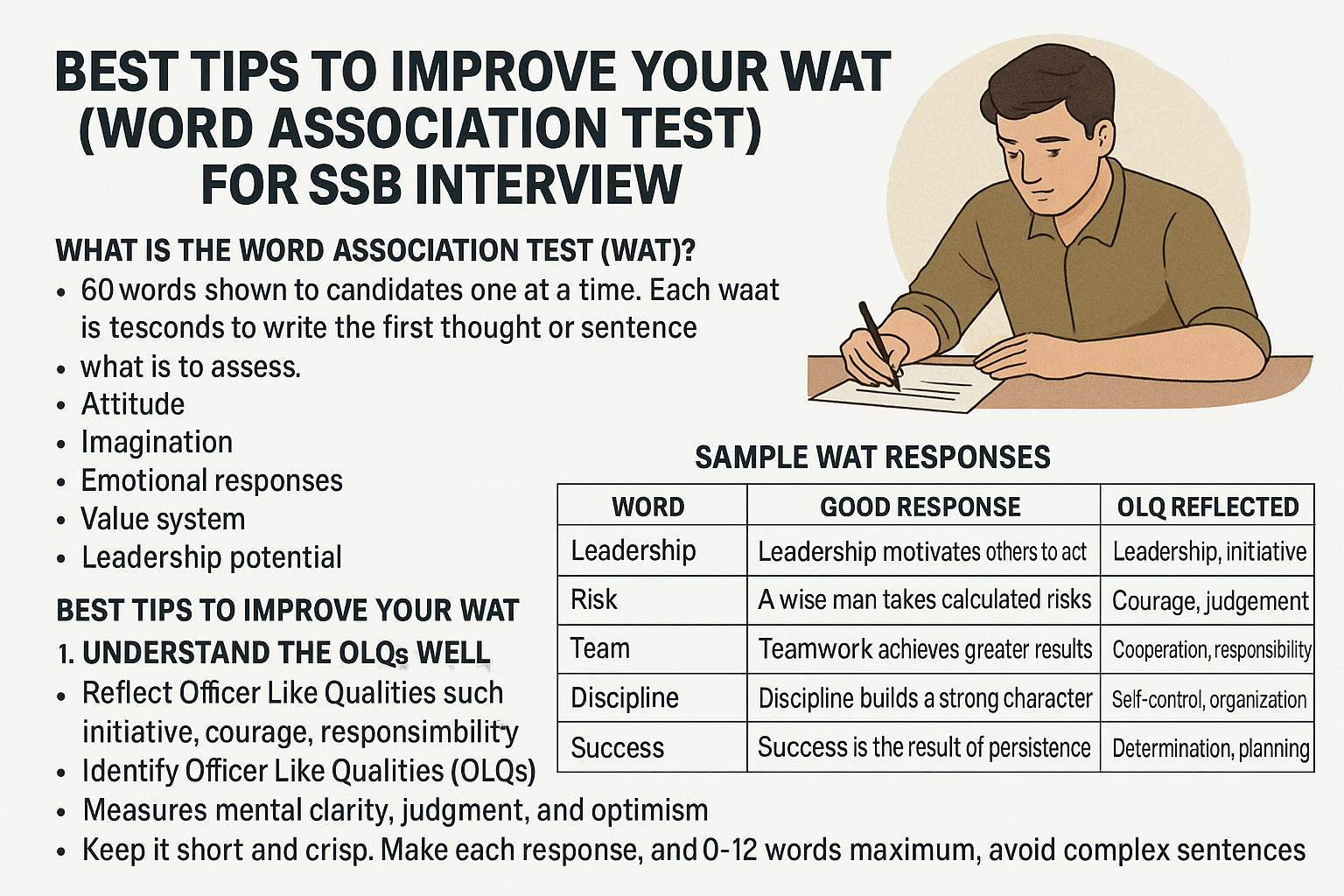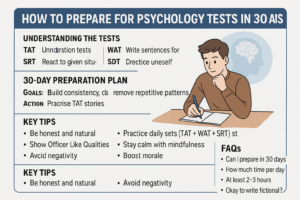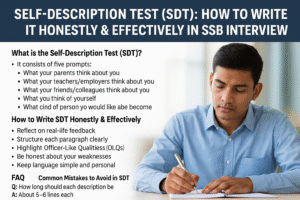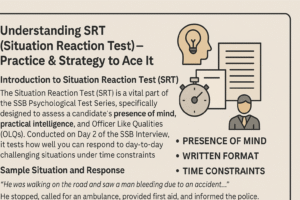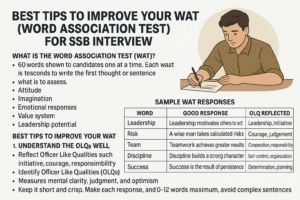What is the Word Association Test (WAT)?
The Word Association Test (WAT) in SSB consists of 60 words, shown to candidates one at a time on a screen. Each word is displayed for 15 seconds, and you must write the first thought or sentence that comes to your mind in that time.
The test is meant to assess your:
Attitude
Imagination
Emotional responses
Value system
Leadership potential
Important: WAT is not a vocabulary test—it’s about what you think, how you think, and how fast you think.
Objective of the WAT
The purpose of WAT is to:
Evaluate your subconscious personality
Judge your ability to respond under pressure
Identify your Officer Like Qualities (OLQs)
Measure your mental clarity, judgment, and optimism
Best Tips to Improve Your WAT in SSB
1. Understand the OLQs Well
Every response in WAT should indirectly reflect one or more of the 15 Officer Like Qualities, such as:
Initiative
Courage
Responsibility
Social adaptability
Determination
Effective Intelligence
Planning and organizing
2. Think Positively and Constructively
Even if the word seems negative (e.g., “Failure”, “Death”, “Fight”), your response must reflect a positive mindset.
Examples:
Failure – Failure teaches better lessons than success.
Fear – Fear can be overcome through preparation.
3. Use Active Voice and Action-Oriented Responses
Your sentences should show action. Instead of making statements, focus on what the subject does.
Bad: Hard work is good.
Better: Hard-working people achieve goals.
4. Keep It Short and Crisp
Each WAT response should be:
Clear
Precise
10–12 words max
Avoid complex sentences or long explanations. Simple thoughts are best.
5. Be Consistent With Your Personality
Your responses across all 60 words should reflect consistency in values. Don’t try to fake OLQs. Be authentic.
For example, if one word response shows aggression and another shows passivity, it may reflect instability.
6. Avoid Negative or Controversial Ideas
Don’t show:
Violence
Revenge
Politics
Superstition
Depression
Focus on solutions, hope, growth, and team spirit.
7. Practice Daily With Word Sets
Use online WAT practice sets or SSB preparation books. Practice 60 words daily with a 15-second timer.
Apps and online tests simulate the pressure and train your brain to respond faster.
8. Learn from Your Mistakes
After each mock WAT test, analyze your responses:
Are they too generic or cliché?
Are you projecting OLQs naturally?
Are your responses repetitive?
Keep refining them.
9. Stay Calm and Mindful During the Test
In the actual test:
Don’t panic if you miss a word. Focus on the next one.
Stay centered and composed.
Write what genuinely comes to your mind.
10. Avoid Memorized or Forced Responses
Do not memorize responses. Assessors can easily detect mechanical answers. Let your subconscious mind respond naturally.
Sample WAT Responses
| Word | Good Response | OLQ Reflected |
|---|---|---|
| Leader | A leader motivates others to act | Leadership, initiative |
| Risk | A wise man takes calculated risks | Courage, judgment |
| Team | Teamwork achieves greater results | Cooperation, responsibility |
| Discipline | Discipline builds a strong character | Self-control, organization |
| Success | Success is the result of persistence | Determination, planning |
| Enemy | A good soldier respects all opponents | Balanced thinking, respect |
Final Thoughts
Improving your performance in the Word Association Test requires clarity of thought, speed, and self-awareness. The best way to crack the WAT is not through memorization, but through consistent practice, positive mindset, and a deep understanding of your own values and OLQs.
Let your thoughts flow naturally, reflect a solution-driven approach, and keep your answers rooted in reality. That’s how you ace the WAT in SSB.
FAQ: Word Association Test (WAT) in SSB
Q1. How much time is given for each word in WAT?
You get 15 seconds per word to write a sentence.
Q2. What kind of words appear in WAT?
Both positive and negative words—like Hope, Anger, Leader, Death, Team, etc.
Q3. Can I skip a word during WAT?
It’s advisable not to skip. But if you miss one, focus on the next. Don’t panic.
Q4. Is vocabulary important in WAT?
No. Simple, meaningful sentences are preferred over complex language.
Q5. How many words are given in WAT?
You’ll be shown 60 words, one after another.
Q6. How do assessors judge WAT responses?
They look at the consistency, mental clarity, positive attitude, and reflection of OLQs in your responses.
Q7. Can I prepare for WAT in advance?
Yes. Practice daily with mock tests to improve speed, clarity, and consistency.

